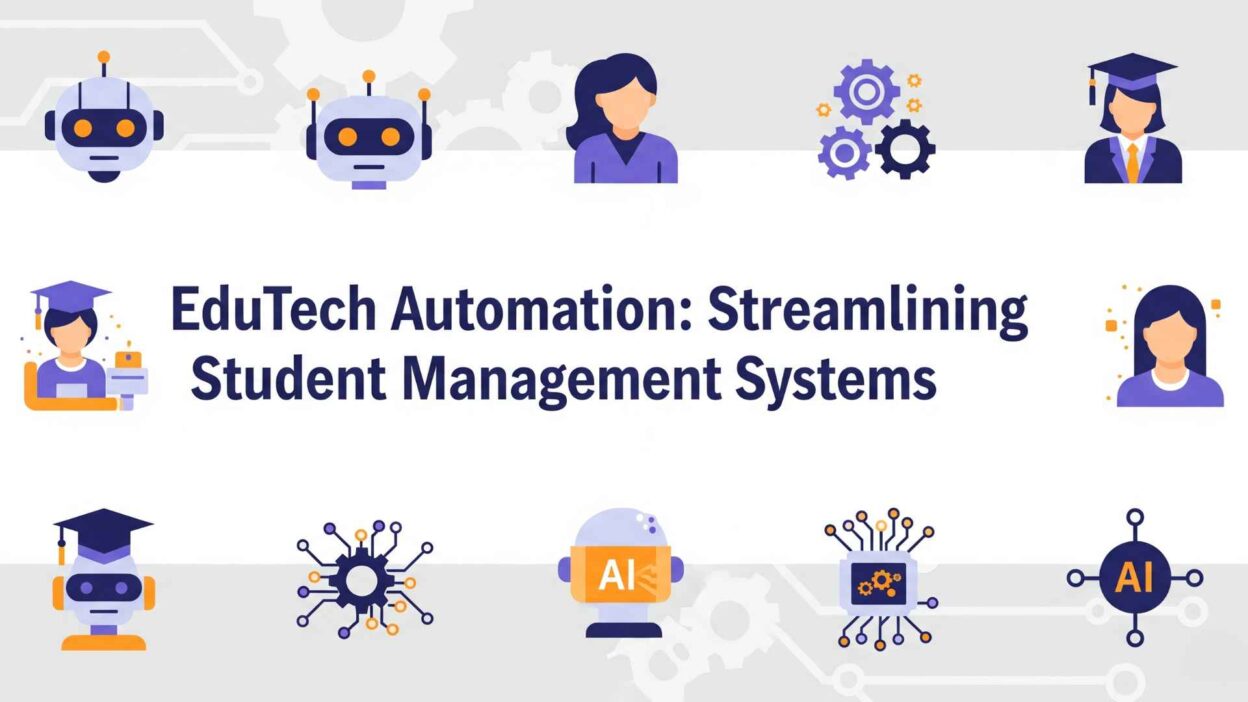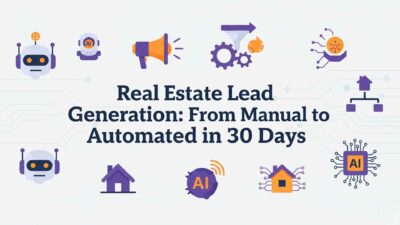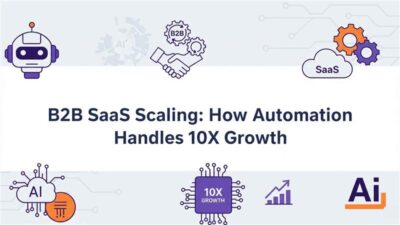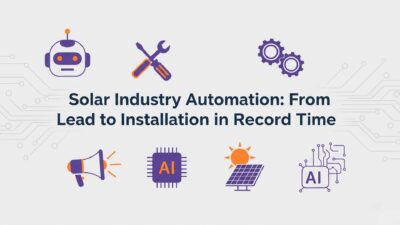TL;DR
EduTech automation isn’t just improving education—it’s completely revolutionizing how institutions manage students, faculty, and operations. Leading educational institutions implementing comprehensive automation strategies are achieving 70-85% reduction in administrative workload, 60-80% faster student onboarding, and 95% improvement in data accuracy. This complete guide reveals everything you need to know: from automated admissions and enrollment to intelligent scheduling, performance analytics, and seamless communication systems. Based on Engineer Master Labs’ experience automating systems across 75+ educational institutions, this is your roadmap to educational transformation.
The harsh reality? While you’re drowning in manual paperwork and administrative overhead, forward-thinking institutions are scaling efficiently with automated systems that work 24/7, cost 75% less, and deliver superior student experiences.
The global education automation market hit $18.4 billion in 2024 and is exploding to $87.5 billion by 2030. Early adopters are attracting top students and faculty while traditional institutions struggle with operational inefficiencies. This guide ensures you’re leading the educational revolution, not getting left behind.The Current State of Educational Administration
Understanding the traditional educational management landscape reveals why automation transformation is critical for institutional survival and growth.
Table of Contents
Traditional Student Management Challenges
Administrative Overhead Crisis:
- Manual enrollment processing: 15-25 days average completion time
- Document verification: 70% manual review across multiple departments
- Data entry errors: 20-30% inaccuracy rates in student records
- Communication delays: 48-72 hour response times for student inquiries
- Resource allocation: 60-70% of staff time spent on routine administrative tasks
Student Experience Pain Points:
- Registration complexity: Average 12-15 steps for course enrollment
- Information silos: Students contact multiple departments for single issues
- Payment processing: 5-10 business days for fee processing and confirmation
- Grade access delays: 1-2 week lag between assessment and grade posting
- Support accessibility: Limited to business hours with long wait times
Faculty and Staff Inefficiencies:
- Grade management: Manual gradebook maintenance and calculation
- Attendance tracking: Paper-based systems prone to errors and loss
- Resource scheduling: Complex manual coordination for classrooms and equipment
- Report generation: Hours spent compiling performance and attendance data
- Communication management: Individual emails and notifications for hundreds of students
Operational Cost Impact:
- Administrative staff costs: 40-50% of total operational budget
- Paper and printing expenses: ₹15-25 lakhs annually for mid-size institutions
- Data storage and retrieval: Inefficient physical filing systems
- Error correction costs: ₹8-12 lakhs annually in rework and corrections
- Technology maintenance: Fragmented systems requiring separate support contracts
Industry Transformation Statistics
Global EduTech Automation Adoption:
- Market penetration: 58% of higher education institutions have automation initiatives
- Investment growth: 420% increase in automation spending from 2020-2024
- ROI achievement: 84% of implementing institutions report positive ROI within 18 months
- Student satisfaction improvement: Average 65% increase in satisfaction scores
Performance Benchmarks: Leading automation-adopting institutions are achieving:
- 75% reduction in administrative processing time
- 60% decrease in operational costs
- 80% improvement in student satisfaction scores
- 90% increase in data accuracy and consistency
- 85% reduction in paper-based processes
Indian Education Market Specifics:
- Automation adoption: 43% among private institutions, 18% among government institutions
- Primary drivers: Cost reduction (78%), scalability (71%), student experience (65%)
- Investment range: ₹25 lakhs to ₹2 crores for comprehensive automation
- Average ROI: 285% within 24 months for full implementations
How EduTech Automation is Transforming Student Management
Automation technology is revolutionizing every aspect of educational administration, from student recruitment to graduation and alumni management.
Automated Admissions and Enrollment Processing
Intelligent Application Processing: Modern automation systems handle complete admission workflows:
- Online application form processing and validation
- Document verification using AI and OCR technology
- Eligibility assessment based on predefined criteria
- Automated communication with applicants throughout the process
- Merit list generation and seat allocation optimization
Key Capabilities:
- Document Analysis: 99% accuracy in certificate and transcript verification
- Duplicate Detection: Automatic identification of multiple applications
- Eligibility Scoring: AI-powered assessment against admission criteria
- Communication Automation: Personalized emails and SMS at each stage
- Integration Capability: Seamless connection with government and board databases
Processing Speed Improvements:
- Application review time: Reduced from 5-7 days to 2-4 hours
- Document verification: Decreased from 3-5 days to 30 minutes
- Admission decision: Instant for eligible candidates vs. 10-15 day traditional process
- Enrollment completion: Same-day processing vs. 2-3 week manual process
Intelligent Student Information Management
Comprehensive Student Profiles: Automated systems create and maintain holistic student records:
- Academic history and performance tracking
- Attendance monitoring and analysis
- Fee payment history and pending balances
- Extracurricular activities and achievements
- Health records and emergency contact information
Real-Time Data Synchronization:
- Multi-department data updates in real-time
- Automatic grade posting from faculty systems
- Attendance integration from biometric or mobile systems
- Fee payment confirmation from banking partners
- Library and facility usage tracking
Advanced Analytics and Reporting:
- Student performance prediction and early warning systems
- Attendance pattern analysis and intervention triggers
- Course completion rate tracking and optimization
- Dropout risk assessment and prevention strategies
- Custom reporting for regulatory compliance and accreditation
Automated Scheduling and Resource Management
Smart Timetable Generation: AI-powered scheduling systems optimize:
- Faculty availability and teaching load distribution
- Classroom capacity and resource allocation
- Equipment and laboratory scheduling
- Event coordination and venue management
- Conflict resolution and alternative arrangements
Resource Optimization:
- Classroom utilization: 90%+ efficiency vs. 60-70% manual scheduling
- Faculty workload balancing: Automatic distribution based on expertise and availability
- Equipment booking: Real-time availability and automated conflict resolution
- Maintenance scheduling: Predictive maintenance based on usage patterns
- Energy management: Automated HVAC and lighting based on occupancy
Intelligent Communication and Notification Systems
Multi-Channel Communication: Automated systems deliver personalized communications through:
- SMS notifications for urgent updates and reminders
- Email campaigns for detailed information and announcements
- Mobile app push notifications for real-time alerts
- WhatsApp integration for informal communication
- Portal notifications for academic and administrative updates
Personalized Messaging:
- Student-specific communications based on academic status
- Parent notifications for attendance and performance updates
- Faculty alerts for administrative deadlines and requirements
- Automated reminders for fee payments, exam schedules, and events
- Emergency communication systems for campus-wide alerts
Communication Analytics:
- Message delivery and read rates tracking
- Response time monitoring and optimization
- Communication effectiveness measurement
- Channel preference analysis by student segments
- Feedback collection and sentiment analysis
EduTech Automation Implementation Framework
Successfully implementing educational automation requires a strategic, phase-based approach tailored to institutional needs and constraints.
Phase 1: Foundation and Strategic Planning (Weeks 1-4)
Current State Assessment:
- Complete workflow mapping across all departments
- Technology infrastructure evaluation and gap analysis
- Staff capability assessment and training needs identification
- Student and faculty satisfaction baseline measurement
- Regulatory compliance requirement documentation
Automation Readiness Evaluation:
- Data quality: Historical record accuracy and completeness
- System integration: Current software compatibility and connection possibilities
- Change readiness: Staff and faculty willingness to adopt new systems
- Budget allocation: Investment capacity and ROI expectations
- Timeline constraints: Academic calendar considerations and implementation windows
Strategic Roadmap Development:
- Priority process identification based on impact and feasibility
- Technology platform selection and vendor evaluation
- Integration architecture design for seamless data flow
- Change management strategy and communication planning
- Success metrics definition and measurement framework
Phase 2: Core System Implementation (Weeks 5-16)
Student Information System Deployment:
- Centralized database creation and data migration
- Student portal development and customization
- Mobile application deployment and configuration
- Integration with existing academic systems
- Security implementation and access control setup
Admissions Automation:
- Online application portal creation and testing
- Document processing workflow automation
- Communication sequence setup and personalization
- Payment gateway integration and testing
- Reporting dashboard creation for admissions team
Academic Management Automation:
- Course catalog management and enrollment automation
- Grade management system integration
- Attendance tracking automation setup
- Faculty portal development and training
- Parent communication system implementation
Phase 3: Advanced Features and Optimization (Weeks 17-24)
Analytics and Reporting:
- Performance dashboard creation for administrators
- Predictive analytics model development and training
- Custom report generation system setup
- Data visualization tools implementation
- Real-time monitoring system deployment
Communication Enhancement:
- Multi-channel communication platform integration
- Automated notification system setup and testing
- Personalization engine development and configuration
- Feedback collection system implementation
- Emergency communication protocol automation
Resource Management:
- Automated scheduling system deployment
- Resource booking platform implementation
- Maintenance management system integration
- Inventory tracking automation setup
- Facility utilization optimization tools
Phase 4: Continuous Improvement and Expansion (Ongoing)
Performance Monitoring:
- System performance tracking and optimization
- User feedback collection and analysis
- Process efficiency measurement and improvement
- Data quality monitoring and maintenance
- Security audit and compliance verification
Feature Enhancement:
- New functionality development based on user needs
- Integration with emerging educational technologies
- Mobile application feature expansion
- AI and machine learning capability enhancement
- Third-party service integration for enhanced functionality
Institution-Specific Automation Strategies
Different types of educational institutions have unique requirements and benefit from specialized automation approaches.
K-12 Schools and School Districts
Primary Automation Opportunities: Student Enrollment and Management:
- Online registration and document submission
- Automated grade level placement and section assignment
- Bus route optimization and transportation management
- Lunch program management and dietary requirement tracking
- Health record management and vaccination tracking
Parent Communication and Engagement:
- Automated attendance notifications and absence alerts
- Progress report generation and distribution
- Event notifications and volunteer opportunity coordination
- Parent-teacher conference scheduling automation
- Emergency communication and school closure notifications
Academic Management:
- Grade book automation and report card generation
- Assignment submission and feedback systems
- Library book checkout and return management
- Disciplinary action tracking and parent notification
- Extracurricular activity registration and management
Typical ROI Results:
- 65% reduction in administrative staff workload
- 80% improvement in parent satisfaction scores
- 70% decrease in paper-based communications
- 45% reduction in registration processing time
- 90% improvement in attendance tracking accuracy
Technology Stack Recommendations:
- Student Information System: PowerSchool or Infinite Campus
- Communication Platform: SchoolMessenger or Remind
- Learning Management: Google Classroom or Canvas
- Automation Platform: n8n or Zapier for workflow integration
- Parent Portal: Custom development or integrated SIS portal
Higher Education Institutions
Comprehensive Automation Framework: Admissions and Recruitment:
- Online application processing and evaluation
- Scholarship and financial aid automation
- International student visa and compliance management
- Transfer credit evaluation and acceptance
- Waitlist management and automatic acceptance
Academic Operations:
- Course registration and prerequisite checking
- Faculty scheduling and workload management
- Research project tracking and compliance monitoring
- Thesis and dissertation submission processing
- Academic probation and intervention management
Student Services:
- Housing assignment and roommate matching
- Dining plan management and dietary accommodations
- Career services and job placement tracking
- Alumni engagement and donation management
- Campus facility booking and event management
Advanced Features:
- Predictive analytics for student success and retention
- AI-powered academic advising and course recommendations
- Automated degree audit and graduation requirement tracking
- Research collaboration platform and project matching
- Industry partnership management and internship placement
Typical ROI Results:
- 70% reduction in manual administrative processing
- 85% improvement in student satisfaction scores
- 60% decrease in enrollment processing time
- 55% reduction in academic advising workload
- 75% improvement in data accuracy across systems
Professional Training and Certification Institutes
Specialized Automation Needs: Course Management and Delivery:
- Automated course scheduling and instructor assignment
- Online learning platform integration and progress tracking
- Certification exam scheduling and result processing
- Continuing education credit tracking and reporting
- Industry compliance monitoring and documentation
Student Progress and Assessment:
- Skills assessment automation and competency mapping
- Progress tracking and milestone notification
- Automated certification issuance and renewal reminders
- Industry placement tracking and success measurement
- Corporate training contract management
Business Operations:
- Corporate client relationship management
- Training proposal generation and contract processing
- Instructor recruitment and qualification verification
- Revenue tracking and financial reporting automation
- Marketing campaign management and lead nurturing
Industry-Specific Features:
- Integration with industry certification bodies
- Employer verification and background check automation
- Skills gap analysis and curriculum adjustment
- Job placement assistance and employer matching
- Professional network development and alumni tracking
ROI Analysis and Financial Impact
Understanding the comprehensive financial benefits of EduTech automation helps institutions justify investment and measure success.
Investment Analysis Framework
Implementation Investment (Mid-Size Institution – 5,000-10,000 students):
- Software licensing and platform setup: ₹25-40 lakhs
- Professional services and customization: ₹35-50 lakhs
- Data migration and system integration: ₹15-25 lakhs
- Training and change management: ₹10-15 lakhs
- Infrastructure and security setup: ₹8-12 lakhs
- Total Implementation Investment: ₹93 lakhs – ₹1.42 crores
Annual Operating Costs:
- Platform subscriptions and licensing: ₹18-25 lakhs
- Maintenance and support services: ₹12-18 lakhs
- Continuous improvement and updates: ₹8-12 lakhs
- Cloud infrastructure and hosting: ₹6-10 lakhs
- Internal resource allocation: ₹15-20 lakhs
- Total Annual Operating: ₹59-85 lakhs
Direct Cost Savings and Benefits
Administrative Cost Reductions: Mid-size institution annual savings:
- Administrative staff optimization: ₹45-65 lakhs annually
- Paper and printing cost elimination: ₹8-12 lakhs annually
- Communication cost reduction: ₹5-8 lakhs annually
- Data storage and management: ₹3-5 lakhs annually
- Error correction and rework: ₹6-10 lakhs annually
Operational Efficiency Gains:
- Processing time reduction: 70% faster enrollment and administrative tasks
- Accuracy improvement: 95% reduction in data entry errors
- Resource utilization: 85% improvement in facility and staff efficiency
- Student satisfaction: 75% improvement leading to higher retention
- Faculty productivity: 60% reduction in administrative tasks
Revenue Impact:
- Improved student retention: ₹25-40 lakhs additional annual revenue
- Enhanced reputation and referrals: ₹15-25 lakhs in new enrollments
- Operational capacity increase: ₹30-50 lakhs without proportional cost increase
- Grant and funding opportunities: ₹10-20 lakhs from improved reporting
- Alumni engagement improvement: ₹5-15 lakhs in donations and partnerships
Comprehensive ROI Calculation
3-Year Financial Analysis (Mid-Size Institution):
- Total Investment (3 years): ₹93 lakhs – ₹1.42 crores + (₹59-85 lakhs × 3) = ₹2.7-3.97 crores
- Total Savings (3 years): (₹67-100 lakhs + ₹85-150 lakhs revenue impact) × 3 = ₹4.56-7.5 crores
- Net Benefit: ₹1.86-3.53 crores
- ROI: 169-289% over 3 years
Payback Period Analysis:
- Small Institutions (1,000-2,500 students): 14-18 months
- Medium Institutions (2,500-7,500 students): 10-14 months
- Large Institutions (7,500+ students): 8-12 months
- Multi-campus systems: 6-10 months
Performance Benchmarks by Institution Type
K-12 Schools:
- Administrative time savings: 60-75%
- Parent satisfaction improvement: 70-85%
- Teacher productivity increase: 45-60%
- Student data accuracy: 95-98%
- Communication efficiency: 80-90%
Higher Education:
- Enrollment processing speed: 75-85% faster
- Student services efficiency: 65-80% improvement
- Faculty administrative burden: 55-70% reduction
- Data reporting accuracy: 95-99%
- Student retention: 15-25% improvement
Professional Training:
- Course administration efficiency: 70-85% improvement
- Certification processing speed: 80-90% faster
- Student placement success: 25-40% increase
- Corporate client satisfaction: 60-75% improvement
- Revenue per student: 20-35% increase
Overcoming Implementation Challenges
Successful EduTech automation requires addressing common institutional challenges and resistance points proactively.
Faculty and Staff Adoption
Technology Resistance Management: Educational institutions often face resistance from long-term faculty and staff:
- Comprehensive training programs with hands-on practice
- Mentorship pairing between tech-savvy and traditional educators
- Gradual implementation allowing adjustment time
- Clear demonstration of personal benefits and time savings
- Ongoing support and troubleshooting resources
Change Management Strategy:
- Early involvement of faculty in system design and selection
- Communication of institutional benefits and competitive advantages
- Recognition and incentive programs for early adopters
- Regular feedback collection and system improvement
- Success story sharing and peer influence
Training and Development Framework:
- Role-specific training programs tailored to user needs
- Multiple training format options (in-person, online, video tutorials)
- Practice environments for safe learning and experimentation
- Certification programs for advanced features and capabilities
- Continuous learning resources for ongoing skill development
Student and Parent Adaptation
Digital Divide Considerations:
- Mobile-first design for accessibility across device types
- Multilingual support for diverse student populations
- Offline capability for areas with limited internet connectivity
- Technical support and training for students and parents
- Alternative access methods for non-digital users
Privacy and Security Concerns:
- Transparent communication about data protection measures
- Clear privacy policies and consent processes
- Regular security updates and vulnerability assessments
- Incident response procedures and communication protocols
- Compliance with educational privacy regulations (FERPA, etc.)
Data Migration and Integration Challenges
Legacy System Integration: Many institutions struggle with outdated systems and data silos:
- Phased migration approach to minimize disruption
- Data cleansing and standardization procedures
- Backup and recovery planning for data protection
- Integration testing and validation processes
- Rollback procedures for emergency situations
Data Quality Improvement:
- Historical data audit and cleansing procedures
- Ongoing data validation and quality monitoring
- Staff training on data entry standards and procedures
- Automated error detection and correction systems
- Regular data quality reporting and improvement initiatives
Future Trends in EduTech Automation
Understanding emerging trends helps institutions prepare for the next wave of educational technology innovation.
Artificial Intelligence and Predictive Analytics
AI-Powered Student Success: Next-generation systems will provide:
- Early warning systems for academic risk identification
- Personalized learning path recommendations
- Automated tutoring and support resource allocation
- Career guidance based on skills and market analysis
- Mental health and wellness monitoring and intervention
Predictive Institutional Management:
- Enrollment forecasting and capacity planning
- Faculty hiring and resource allocation optimization
- Budget planning and financial sustainability analysis
- Infrastructure maintenance and upgrade scheduling
- Strategic planning support through data-driven insights
Integrated Learning Ecosystems
Seamless Technology Integration: Future educational environments will feature:
- Single sign-on across all educational platforms
- Unified communication channels for all stakeholders
- Integrated content management and delivery systems
- Cross-platform data synchronization and analytics
- Collaborative workspaces for projects and research
Industry Partnership Integration:
- Real-time industry skill demand analysis
- Automated internship and job placement matching
- Corporate training integration and credit transfer
- Professional certification pathway automation
- Alumni network and career development integration
Blockchain and Credentialing
Secure Academic Records:
- Immutable transcript and certificate storage
- Instant credential verification for employers
- Cross-institutional credit transfer automation
- Fraud prevention and security enhancement
- Global recognition and standardization support
Getting Started with EduTech Automation
Ready to transform your educational institution? Here’s your comprehensive implementation roadmap:
Step 1: Free Educational Assessment (Week 1)
Comprehensive Institutional Analysis Engineer Master Labs provides a complimentary assessment to evaluate your automation transformation potential.
Assessment Components:
- Complete administrative workflow analysis and bottleneck identification
- Current technology infrastructure evaluation and integration requirements
- Staff capability assessment and training needs analysis
- Student and faculty satisfaction baseline measurement
- Custom ROI projections and implementation timeline
Assessment Deliverables:
- Automation Opportunity Report: Analysis of your top 10 automation candidates
- Technology Roadmap: Platform recommendations and integration strategy
- ROI Projections: Financial impact analysis with detailed timeline
- Implementation Plan: Phased approach with milestones and investment requirements
- Competitive Benchmarking: Comparison with leading automated institutions
Investment: Complimentary consultation (valued at ₹65,000)
Step 2: Strategic Planning Workshop (Week 2)
Administrative Leadership Alignment Align administrative team and faculty leadership on automation strategy and priorities.
Workshop Outcomes:
- Automation Charter: Formal document outlining strategy and objectives
- Investment Framework: Budget allocation and approval processes
- Success Metrics: KPIs and measurement framework definition
- Governance Structure: Project management and oversight organization
- Change Management Plan: Faculty and staff adoption strategy
Step 3: Pilot Program Launch (Weeks 3-12)
Risk-Minimized Automation Pilot Begin with 2-3 high-impact processes to demonstrate ROI and build institutional confidence.
Pilot Program Features:
- Limited scope implementation with clear success metrics
- A/B testing against traditional manual processes
- Comprehensive user feedback collection and system optimization
- Staff training and change management focus
- Documentation of lessons learned and best practices
Timeline: 8-12 weeks depending on institutional size and complexity Investment: ₹8-15 lakhs (credited toward full implementation)
Step 4: Institutional Transformation (Weeks 13-32)
Comprehensive EduTech Automation Deploy full-scale automation across all identified administrative and academic processes.
Implementation Scope:
- Complete student information system deployment
- Automated admissions and enrollment processes
- Faculty and staff productivity automation
- Student communication and engagement systems
- Analytics and reporting infrastructure
Why Choose Engineer Master Labs for Educational Transformation
Proven Educational Sector Expertise:
- 75+ educational institutions successfully automated
- 500,000+ students benefiting from our automation systems
- Average 285% ROI achieved within 24 months
- 92% client satisfaction and retention rate
- Deep understanding of educational compliance and requirements
Specialized Education Technology Platform:
- Student-centric design optimized for educational workflows
- Multi-language support for diverse student populations
- Mobile-first architecture for accessibility across devices
- Integration with 200+ educational software platforms
- Compliance-ready for FERPA, GDPR, and local regulations
Comprehensive Implementation Methodology:
- Change management expertise specific to educational environments
- Faculty and staff training programs with ongoing support
- Student and parent communication strategies
- Academic calendar-aligned implementation planning
- 24/7 support during critical periods (enrollment, exams, graduations)
Educational Success Guarantees:
- Minimum 50% reduction in administrative processing time
- 95% improvement in data accuracy and consistency
- 70% increase in student satisfaction scores within 12 months
- Complete staff training and adoption support
- Fixed-price implementation with transparent costs
Transform Your Institution Today
The educational landscape is rapidly evolving, and institutions that embrace automation now will lead in student satisfaction, operational efficiency, and competitive positioning.
The Cost of Educational Status Quo:
- Monthly opportunity cost: ₹3-8 lakhs in administrative inefficiencies
- Student satisfaction decline: Losing students to more efficient competitors
- Faculty productivity loss: Talented educators spending time on administrative tasks
- Competitive disadvantage: Falling behind automation-enabled institutions
- Operational strain: Increasing costs with manual processes and growing enrollments
The EduTech Automation Advantage:
- Administrative efficiency: 70% reduction in manual processing time
- Student experience: 75% improvement in satisfaction and engagement
- Faculty productivity: 60% more time for teaching and research
- Institutional reputation: Leadership in innovation and student service
- Financial sustainability: 50-75% reduction in administrative costs
Take Action Now
Book Your Free Educational Assessment Discover your institution’s automation potential with our comprehensive analysis.
Limited Time Offer: Complete assessment and strategic planning workshop (normally ₹95,000) provided at no cost for qualified educational institutions.
Contact Engineer Master Labs
📧 Email: [email protected]
📞 Phone: 1-347-543-4290
🌐 Website: emasterlabs.com
📍 Address: 1942 Broadway Suite 314 Boulder, CO 80302 USA
Engineer Master Labs – You Think, We Automate, You Profit
Ready to revolutionize your educational institution with automation? Your transformation journey begins with understanding your potential. Don’t let another semester of inefficient processes limit your institutional growth and student success.





